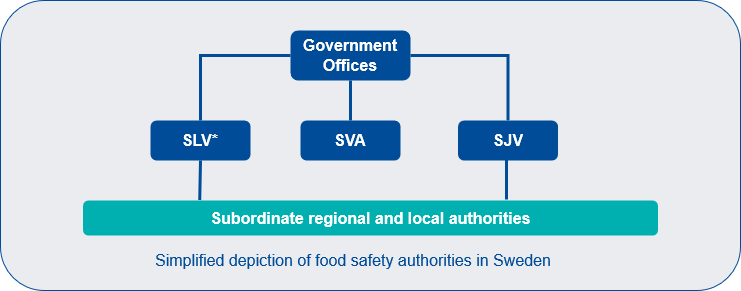Sweden
Last updated on 31 October 2024.
* Host institution of the national EFSA Focal Point. For information on the EFSA Focal Point network, please see the EFSA website.
© worldfoodsafetyalmanac.bfr.berlin
The Food Act is the central legal foundation for food legislation in Sweden. Infringement of food regulations can lead to measures under criminal law and consumer damage claims under civil law, whereby the final decision rests with the courts. Government measures with regard to food safety are often based on scientific risk assessments. However, the final decision on the legality of governmental measures rests with the courts.
In Sweden, there is no institutional separation of food risk assessment and food risk management, as both are performed by the Swedish Food Agency (Livsmedelsverket, SLV). However, an in-house separation between risk assessment and risk management is in place to ensure independence.
The Swedish Veterinary Agency (Statens veterinärmedicinska anstalt, SVA) is responsible for conducting risk assessments, and the Swedish Board of Agriculture (Jordbruksverket, SJV) is responsible for risk management, within their field of expertise.
Ministry of Rural Affairs and Infrastructure
| Name | Ministry of Rural Affairs and Infrastructure (Landsbygds- och infrastrukturdepartementet) |
|---|---|
| Activities |
|
| Responsibilities | |
| Location | Stockholm |
| URL | https://www.government.se/government-of-sweden/ministry-of-rural-affairs-and-infrastructure/ |
Within the Government Offices of Sweden, the Ministry of Rural Affairs and Infrastructure is responsible for agricultural policy and matters related to the entire food chain, including food safety. In close collaboration with other government ministries, policy issues related to food safety and the entire food chain are handled. As specified by their mandate, public agencies (i.e. SLV, SJV and SVA) provide support to the ministry.
Swedish Food Agency (Livsmedelsverket)
| Name | Swedish Food Agency (Livsmedelsverket) |
|---|---|
| Acronym | SLV |
| Activities |
|
| Responsibilities | |
| Location | Uppsala |
| URL | https://www.livsmedelsverket.se/en |
The Swedish Food Agency (SLV) is an independent, non-ministerial government authority. Nonetheless, SLV is accountable to the government and the Government Offices of Sweden.
In the area of food safety, SLV is responsible for risk and benefit assessments, risk communication and risk management. SLV prepares draft legislation on the basis of science-based risk assessments. SLV is responsible for state food inspections and for the subsequent information on the outcome of the control and inspection activities.
Within SLV, the Department of Risk and Benefit Assessment conducts independent risk assessments for food safety issues, including biohazards, novel foods, food supplements and botanicals, genetically modified organisms (GMOs), foodborne infections, contaminants and drinking water. The department also conducts risk assessments for plant protection products and veterinary medicinal product residues in food. However, the regulatory authority for plant protection products is the Swedish Chemicals Agency (Kemikalieinspektionen) and the regulatory authority for veterinary medicinal products is the Medical Products Agency (Läkemedelsverket). SLV provides laboratory analytical services related to food safety.
The remit of the Risk Benefit Assessment Department extends beyond food safety to include nutrition and the conducting of national dietary surveys.
Swedish Board of Agriculture (Jordbruksverket)
| Name | Swedish Board of Agriculture (Jordbruksverket) |
|---|---|
| Acronym | SJV |
| Activities |
|
| Responsibilities | |
| Location | Jönköping |
| URL | https://jordbruksverket.se/languages/english/swedish-board-of-agriculture |
The Swedish Board of Agriculture (SJV) is an independent, non-ministerial government authority. Nonetheless, SJV is accountable to the government and the Government Offices of Sweden.
In the area of feed safety, SJV is responsible for risk communication and risk management. It prepares draft legislation on the basis of science-based risk assessments. It is also responsible for state feed inspections and if necessary, subsequent information for the government on the outcome of control and inspection activities.
The remit of SJV includes residues of plant protection products and GMOs in feed and extends beyond food safety to plant health, animal health and animal welfare.
Swedish Veterinary Agency (Statens veterinärmedicinska anstalt)
| Name | Swedish Veterinary Agency (Statens veterinärmedicinska anstalt) |
|---|---|
| Acronym | SVA |
| Activities |
|
| Responsibilities | |
| Location | Uppsala |
| URL | https://www.sva.se/en/ |
The National Veterinary Institute (SVA) is a risk assessment expert authority in animal health, subordinate to the Government Offices of Sweden. The SVA provides laboratory analytical services and epidemiological and microbiological expertise. The SVA prepares science-based risk assessments in the fields of zoonoses, animal health, feed and environment (including water).
Regional and local levels
The responsibility for Swedish food control is divided between the local, regional and national levels. The regional level in Sweden consists of 21 county authorities and the local level has 290 municipal authorities. The county authorities are responsible for the support and management of the municipal food control. They are also responsible for controls with regard to primary production, hunters, fishers and berry pickers. In some cases, the activities of the regional authorities are steered by the government. Municipal authorities are in charge of controls related to food and drinking water producers and handlers at the local level. The municipal authorities work and make decisions independently.
Article 36 institutions
| Institutions involved in the EFSA network pursuant to Article 36 Reg. (EC) No. 178/2002 |
|---|
|
